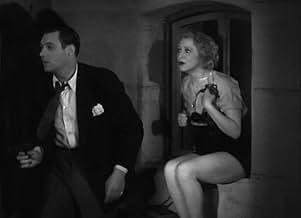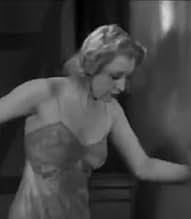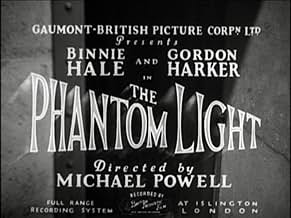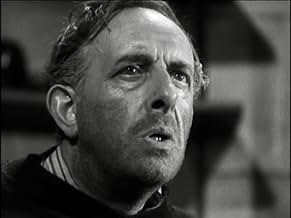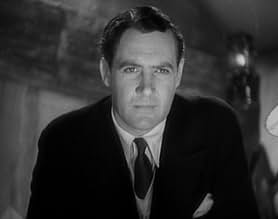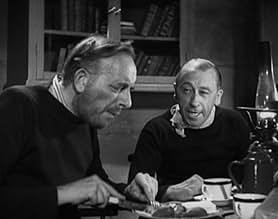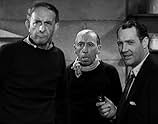A lighthouse keeper has been murdered in mysterious circumstances and, during the ensuing investigation a Phantom Light keeps appearing at the scene of his death.A lighthouse keeper has been murdered in mysterious circumstances and, during the ensuing investigation a Phantom Light keeps appearing at the scene of his death.A lighthouse keeper has been murdered in mysterious circumstances and, during the ensuing investigation a Phantom Light keeps appearing at the scene of his death.
Anthony Holles
- Mr. Mason
- (uncredited)
Ernest Jay
- Railway Worker
- (uncredited)
Vi Kaley
- Woman in Pub
- (uncredited)
John Singer
- Cabin Boy
- (uncredited)
Featured reviews
The Phantom Light is directed by Michael Powell and adapted from the Joan Roy Byford and Evadne Price play The Haunted Light. It stars Gordon Harker, Binnie Hale, Donald Calthrop, Milton Rosmer, Ian Hunter and Herbert Lomas. Cinematography is by Roy Kellino and music by Louis Levy.
Harker stars as lighthouse keeper Sam Higgins, who gets more than he bargained for when he takes up employment at the North Stack Lighthouse out on the foggy Welsh coast.
Some time before he formed half of the classic film making partnership with Emeric Pressburger, Michael Powell was a 1930s purveyor of the "quota-quickie" British movie. Not many of those films remain in print, thankfully this delightful blend of comedy and suspense is now in home format circulation. Out of Gainsborough Pictures, The Phantom Light harks back to a wonderful time of sincerity in film making, the acting mannerisms are as correct as the dialect (it's so nice to hear the term Michaelmas used), the locale is beautifully realised and maximum dramatic impact is garnered from the minimalist settings (three parts of the film is set in the lighthouse itself). Powell proves to be adept at eking out eerie atmospherics from the story, aided superbly by Roy Kellino's photography, while it's no small triumph to actually blend the comedy with the drama and not hurt the flow of the film.
Tan-y-Bwlch and lummee, what a night!
It's not perfect by any stretch of the imagination, Hale is annoyingly high pitched and shoe-horned into the fray, though her beautiful legs go up to her armpits and distract the red blooded amongst us, and the actual turn into the suspense realm comes, considering the running time, a bit too late in the story. But the faults are actually minor ones and they don't ultimately affect the enjoyment on offer for the classic film fan. It very much can be seen as a precursor and influence to the great Will Hay pictures, Ask A Policeman & Oh! Mr. Porter, and if you want links away from the thematics and plotting? Which are joyously similar, then Herbert Lomas was in Ask A Policeman and Louis Levy scored both. It doesn't have the slapstick that dominated the Hay movies, here the wit is dry and neatly pitched as polar opposites are thrust together under one lighted roof, but this is more a light hearted thriller than a comedy drama. With excellent locations used (Devon/Wales), and a director taking his early tentative steps to greatness (yes you read right), it's a film that has enough reasons to check it out regardless of story. As it is, it's pretty darn good anyway. And I'll be back to say the same thing after my next viewing at Michaelmas. 7.5/10
Harker stars as lighthouse keeper Sam Higgins, who gets more than he bargained for when he takes up employment at the North Stack Lighthouse out on the foggy Welsh coast.
Some time before he formed half of the classic film making partnership with Emeric Pressburger, Michael Powell was a 1930s purveyor of the "quota-quickie" British movie. Not many of those films remain in print, thankfully this delightful blend of comedy and suspense is now in home format circulation. Out of Gainsborough Pictures, The Phantom Light harks back to a wonderful time of sincerity in film making, the acting mannerisms are as correct as the dialect (it's so nice to hear the term Michaelmas used), the locale is beautifully realised and maximum dramatic impact is garnered from the minimalist settings (three parts of the film is set in the lighthouse itself). Powell proves to be adept at eking out eerie atmospherics from the story, aided superbly by Roy Kellino's photography, while it's no small triumph to actually blend the comedy with the drama and not hurt the flow of the film.
Tan-y-Bwlch and lummee, what a night!
It's not perfect by any stretch of the imagination, Hale is annoyingly high pitched and shoe-horned into the fray, though her beautiful legs go up to her armpits and distract the red blooded amongst us, and the actual turn into the suspense realm comes, considering the running time, a bit too late in the story. But the faults are actually minor ones and they don't ultimately affect the enjoyment on offer for the classic film fan. It very much can be seen as a precursor and influence to the great Will Hay pictures, Ask A Policeman & Oh! Mr. Porter, and if you want links away from the thematics and plotting? Which are joyously similar, then Herbert Lomas was in Ask A Policeman and Louis Levy scored both. It doesn't have the slapstick that dominated the Hay movies, here the wit is dry and neatly pitched as polar opposites are thrust together under one lighted roof, but this is more a light hearted thriller than a comedy drama. With excellent locations used (Devon/Wales), and a director taking his early tentative steps to greatness (yes you read right), it's a film that has enough reasons to check it out regardless of story. As it is, it's pretty darn good anyway. And I'll be back to say the same thing after my next viewing at Michaelmas. 7.5/10
Gordon Harker arrives at the tiny Welsh village where everyone seems to be named Owen. He's to take over the light house in the bay. He listens to stories about the Ghost Light that led the two earlier masters to their death: the light goes out, another one appears, and guides a ship onto the rocks. "Wreckers" he says, and thinks no more of it. He also doesn't think much of Ian Hunter, who claims to be a reporter and offers him lots of money to go to the lighthouse, nor of Binnie Hale, who also makes the same request. He's proud of his 25 years in the service, and runs things by the book. When he gets to the house, there's a helper who's being tended to by doctor Milton Rosmer. Most of the time he's out, but occasionally he gets up and tries to kill someone with his bare hands.
It's a nicely opened version of the stage play by Evadne Price and Joan Roy Byford., with some nice location shooting in th west counties and Wales. It makes me wonder if this was the inspiration for dirctor Michael Powell to wander the island, far from London, and look at the weird and wonderful way people live far from London.
It's a nicely opened version of the stage play by Evadne Price and Joan Roy Byford., with some nice location shooting in th west counties and Wales. It makes me wonder if this was the inspiration for dirctor Michael Powell to wander the island, far from London, and look at the weird and wonderful way people live far from London.
There's a nice undercurrent of comedy running through this otherwise standard mystery story. Set in a "haunted" lighthouse on the supposedly lonely Welsh coast, there seems to be a remarkable crowd of characters bumping into each other at every turn. The plot starts out promisingly with much talk of ghostly terror, but settles into a rather lame and predictable conclusion.
The local Welsh villagers are mercilessly satirized as dim-witted, inbred provincials, in contrast with the smarty pants Londoners who've dropped in to sort out this here ghostly nonsense. An apparently nymphomanic young blonde with no relevance to the story other than removing various items of clothing as things progress, adds to the sly humour.
There's lots of excellent location cinematography of craggy Welsh rocks and crashing waves to provide a suitably moody background.
Taking all these elements together, I came away mildly entertained, although not mentally stimulated. Good late night fun.
The local Welsh villagers are mercilessly satirized as dim-witted, inbred provincials, in contrast with the smarty pants Londoners who've dropped in to sort out this here ghostly nonsense. An apparently nymphomanic young blonde with no relevance to the story other than removing various items of clothing as things progress, adds to the sly humour.
There's lots of excellent location cinematography of craggy Welsh rocks and crashing waves to provide a suitably moody background.
Taking all these elements together, I came away mildly entertained, although not mentally stimulated. Good late night fun.
Superficially, this is just another of the many British comedy/dramas from the era. It has a characteristic manner: a fellow with a humorous take on life, a pretty girl, some intrigue and danger.
What sets this apart are two things.
The first is the setting in Wales, or more precisely among the Welsh. Its an odd sort or layering for me since I think the 30's era English are as different, strange, quaint to me as the Welsh are shown here from the English. The language is emphasized in the setup, first half of the movie. They surely are depicted as alien. At the end, there's a clear balance between evil Welsh and noble ones that come to the rescue. The chief villain of course, the ringmaster, is English of course. That Imperial undercurrent!
The second interesting thing is that the action, about 3/5s of the movie, takes place in an actual lighthouse, most at night. What an amazing challenge this must have been; there are no studio shots that I could discern. Its a small, curved structure with no opportunity to anchor the frame against a wall. There's lots of movement across different levels, as there must be, and some clever (from a staging point of view) movement from inside to outside. I suppose the director made up much of how this appears as he went along.
Ted's Evaluation -- 2 of 3: Has some interesting elements.
What sets this apart are two things.
The first is the setting in Wales, or more precisely among the Welsh. Its an odd sort or layering for me since I think the 30's era English are as different, strange, quaint to me as the Welsh are shown here from the English. The language is emphasized in the setup, first half of the movie. They surely are depicted as alien. At the end, there's a clear balance between evil Welsh and noble ones that come to the rescue. The chief villain of course, the ringmaster, is English of course. That Imperial undercurrent!
The second interesting thing is that the action, about 3/5s of the movie, takes place in an actual lighthouse, most at night. What an amazing challenge this must have been; there are no studio shots that I could discern. Its a small, curved structure with no opportunity to anchor the frame against a wall. There's lots of movement across different levels, as there must be, and some clever (from a staging point of view) movement from inside to outside. I suppose the director made up much of how this appears as he went along.
Ted's Evaluation -- 2 of 3: Has some interesting elements.
Michael Powell's genius is exploding in wondrous innovations and marvels of imagination already in this early film about Wales. The introduction sets the mood, when a Welsh woman as the station master comes to greet a train with its passenger, the new lighthouse guard, in a fantastic local rural costume like a witch and speaking no word of English but only Welsh,. The hysterical intrigues and events are very much reminding of Hitchcock's "Number Seventeen" three years earlier, the same kind of mix of terror and madness, eccentrics and cluster of colliding events, getting grimmer all the time, but the local atmosphere is the dominating charm. It's about wreckers using the local people's readiness for superstition to operate their wicked business, Hitchcock was to use the same theme in "Jamaica Inn" four years later, and both films are equally successful and irresistibly charming and exciting. There is no Charles Laughton and Maureen O'Hara here, but instead you have Gordon Harker who is the right man for the job, although he gets too much to handle. The story is terrific, and Michael Powell was to use much of the same vein in his later masterpiece "I Know Where I Am Going" in Scotland ten years later.
Did you know
- TriviaWhen Alice Bright (Binnie Hale) remarks that she had just been performing in a play, Sam Higgins (Gordon Harker) retorts, "East Lynne?" This is a reference to the oft produced play and movie of Mrs. Henry Wood's novel of the same name. "East Lynne" was enjoyed for its mad plot and frequently incomprehensible dialogue.
- GoofsSam Higgins arrives at Tan y Bwlch to take a boat to the North Stack lighthouse offshore. Both places exist but are about 60 miles apart. Tan y Bwlch is on the shore of a reservoir, not the sea, and North Stack lighthouse, on the isle of Anglesey, is onshore, not off.
- Quotes
Alice Bright: Mr Higgins. I'm going to tell you the truth. I'm an actress, hiding from the police.
Sam Higgins: What, you act as bad as all that?
- ConnectionsFeatured in Made in England: The Films of Powell and Pressburger (2024)
Details
- Runtime
- 1h 16m(76 min)
- Color
- Aspect ratio
- 1.37 : 1
Contribute to this page
Suggest an edit or add missing content

